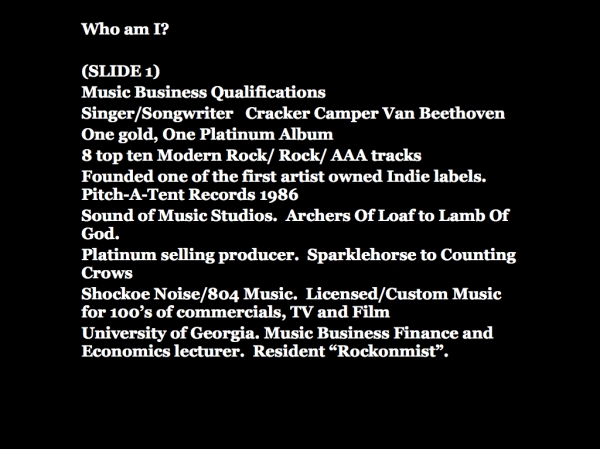David Lowery, producer, songwriter, singer, activist, leader of both Camper van Beethoven and Cracker, (two of my favorite bands from then and now) has been compiling some really compelling information on how musicians/artists are being compensated in the new digital age, and how now that stores like iTunes, etc. are established as money making business models that now is the time to start paying the artists more as the "risk" involved setting the ideas up in the early 2000's has been "amortized" more or less. This is my take on the article. I'm a musician, songwriter, content creator, etc. and this topic really interests me, so I'm reposting a section from David's article here on the Boy on the Bike Blog. Links are included to read the rest of this article and the other 4 parts of it. Hope you find it compelling as I did.
Meet The New Boss, Worse Than The Old Boss? Part 1.
By David Lowery
Part 1 of a 5 part post
(Copyright in the author, used by permission)
What follows is based on my notes and slides from my talk at SF Music Tech Summit. I realize that I’m about to alienate some of my friends that work on the tech side of the music business. These are good well intentioned people who genuinely want to help musicians succeed in the new digital paradigm. But if we are gonna come up with a system to compensate artists fairly in the new digital age we need an honest discussion of what is going on. The tech side of the music business really needs to look at how their actions and policies negatively impact artists, just as they have pointed out the negative effect record company actions have had on artists.
Too often the debate has been pirates vs the RIAA. This is ridiculous because the artists, the 99 percent of the music business are left out of the debate. I’m not advocating going back to the old record label model, to an industry dominated by the big three multi-national labels. This is a bit of hyperbole intended to make us all think about this question: Is the new digital model better for the artist?
Meet the New Boss, Worse than the old boss
Introduction
I was like all of you. I believed in the promise of the Internet to liberate, empower and even enrich artists. I still do but I’m less sure of it than I once was. I come here because I want to start a dialogue. I feel that what we artists were promised has not really panned out. Yes in many ways we have more freedom. Artistically this is certainly true. But the music business never transformed into the vibrant marketplace where small stakeholders could compete with multinational conglomerates on an even playing field.
In the last few years it’s become apparent the music business, which was once dominated by six large and powerful music conglomerates, MTV, Clear Channel and a handful of other companies, is now dominated by a smaller set of larger even more powerful tech conglomerates. And their hold on the business seems to be getting stronger.
On one hand it doesn’t bother me because the “new boss” doesn’t really tell me what kind of songs to write or who should mix my record. But on the other hand I’m a little disturbed at how dependent I am on these tech behemoths to pursue my craft. In fact it is nigh impossible for me to pursue my craft without enriching Apple, Amazon, Facebook and Google. Further the new boss through it’s surrogates like Electronic Frontier Foundation seems to be waging a cynical PR campaign that equates the unauthorized use of other people’s property (artist’s songs) with freedom. A sort of Cyber –Bolshevik campaign of mass collectivization for the good of the state…er .. I mean Internet. I say cynical because when it comes to theirintellectual property, software patents for instance, these same companies fight tooth and nail.
Meet the new boss, he wants to collectivize your songs!
The other problem? I’ve been expecting for years now to see aggregate revenue flowing to artist increase. Disintermediation promised us this. It hasn’t happened. Everywhere I look artists seem to be working more for less money. And every time I come across aggregate data that is positive it turns out to have a black cloud inside. Example: Touring revenues up since 1999. Because more bands are touring, staying on the road longer and playing for fewer people. Surely you all can see Malthusian trajectory?
SLIDE 1 [ MORE... ]

